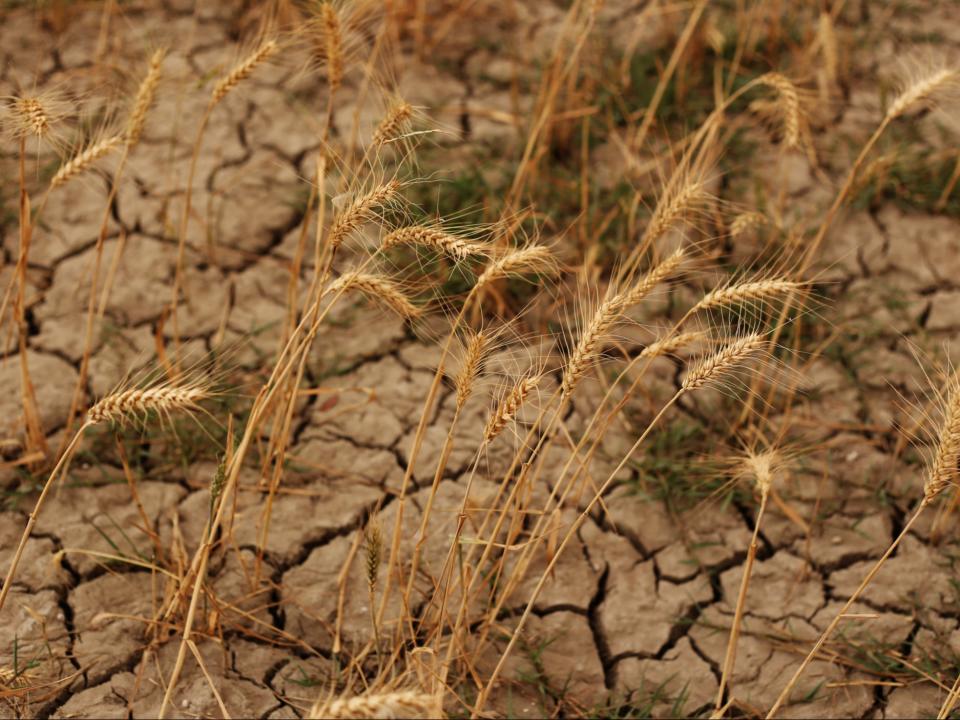UK farmers failing to adapt to extreme weather brought by climate crisis, study finds

Extreme weather events such as very heavy rain or prolonged dry spells, which have impacted the UK in recent years, are expected to increase in severity in future due to the worsening climate crisis, but many farmers are not adapting to these changes, new research suggests.
Many farmers are already concerned about the impact of heat and drought on crop and grass growth, as it can have impacts on yields as well as winter animal feed, while heavy rainfall and flooding can result in soil run-off and erosion, which also impacts crops.
But researchers from the University of Exeter said that ‘for a number of farmers, however, ongoing and future changes to our weather and climate were seen as too uncertain and too long-term for them to invest significant time or money in planning for them now”.
Instead, many farmers remain focused on short-term profitability and business survival in a challenging economic environment.
The researchers said: “Although there is a growing acceptance that the climate is changing and that there are benefits to taking action, uncertainties about the exact scale, speed and nature of change locally, make it difficult for farmers to plan ahead.”
Dr Rebecca Wheeler from the University of Exeter’s Centre for Rural Policy Research said: “Farmers have an array of challenges and uncertainties to cope with, and it is understandable they are focused on the short-term profitability and survival of their business.”
But she warned: “This seems to be preventing them from adapting to the effects of the climate emergency.
“It is essential the industry finds ways to build resilience, and that farm businesses are supported in planning and responding to changing weather patterns.”
The research team said they carried out 31 in-depth interviews, including 15 with farmers and 16 with stakeholders including advisors, consultants and industry representatives.
A number of agricultural stakeholders said they were concerned that too few farm businesses are taking sufficient action to increase their business resilience to extreme weather and climate change.
But the study also highlighted the capacity for innovation and adaptability within the farming industry, the researchers said.
Many farmers are taking action to improve the long term outlook for their farms, including working to to improve soil health, monitoring crop and grass varieties and growing techniques, installing ventilation for livestock, increasing rainwater storage capacities, and expanding the diversity of their crops and other enterprises.
The study team suggested there is also reason for farmers to be optimistic about some of the opportunities posed by climate change, such as warmer temperatures enabling new crops and increased yields in some instances, as long as they are able to weather the challenges posed by negative effects.
Professor Matt Lobley, also from the University of Exeter’s Centre for Rural Policy Research, said: “There are many innovative and exciting activities happening on farms across the country, but much is still to be done to improve the resilience of individual farms and the industry as a whole.
“Few farmers described themselves as directly adapting to climate change but most did see themselves as taking positive steps to respond to the risks of extreme weather or to generally improve their business resilience. For a number of farmers this primarily took the form of improving soil health.”
Industry representatives involved in the research welcomed such positive steps but called for greater uptake of these and other measures.
The research team said the findings highlighted a need for government and agricultural stakeholders to work with farmers to help them understand the risks posed to their particular business from extreme weather and climate change.
“Actions to help farmers respond and adapt to these risks include improved industry collaboration, creating opportunities for farmer-to-farmer learning, and providing tailored tools and support that take into account the specificities of different farming systems,” they said.
The research is published in the journal Climate Risk Management.
Read More
Texas farmer speaks after finding abandoned migrant girls on land
Restoring UK’s peatlands, forests and grasslands ‘vital’ for tackling climate crisis, report says

 Yahoo Finance
Yahoo Finance 